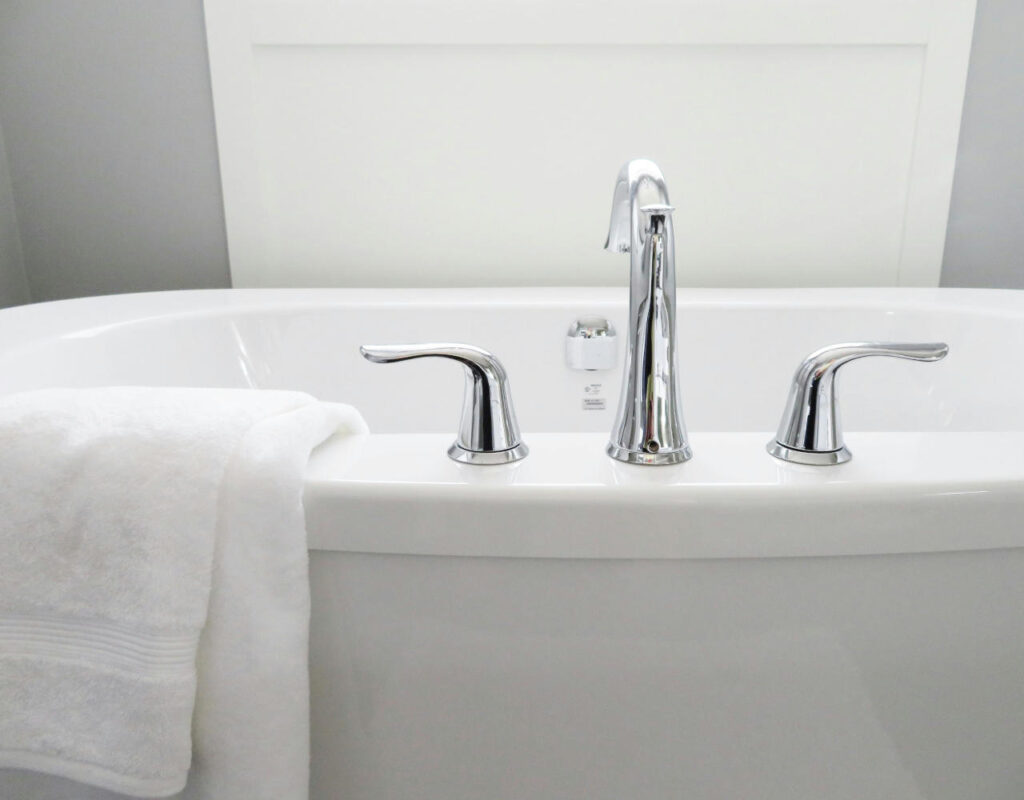Your cart is currently empty!
5 Ways Bidets Improve Your Health & Hygiene
If there was poop on your arm would you just wipe it off with a dry paper towel and go on about your day? We doubt it. Most people would thoroughly wash their arm. So, why do you just use paper to clean your bum? Not to be rude, but it’s not very hygienic, nor is it efficient.
Billions of people around the world use water and always have, but the paper industry in the US has pushed toilet paper as the only option to American consumers, and tried to make it seem like a luxury item. Thankfully, Americans are finally catching on that there is an easier and more effective way to clean themselves, which also has significant health and hygiene benefits over just using paper. Read more below about these benefits, or skip ahead to what interests you most:
- Removes more particles and residue
- Lowers risk of UTIs
- Prevents spread of Norovirus
- Heals and prevents hemorrhoids
- Doesn’t irritate sensitive skin
When you combine improved health and hygiene with lower environmental impact and cost savings on toilet paper, making the switch is an easy decision.
1. Removes more particles and residue

Feel as clean as if you just stepped out of the shower or bath, every time you go
Cleaning yourself with toilet paper can leave behind tiny particles, residue, and potentially odors, no matter how much you use or how soft and durable its supposed to be. While wet wipes are more effective than dry toilet paper, they still smear and leave residue behind. Not to mention they sit in your trash can along with everything they removed. (Wet wipes should never be flushed — even if the packaging claims “flushable”, there are no wet wipes that decompose well enough as to not cause sewage problems.)
In order to actually be and feel clean, you need to wash yourself – and that’s exactly what an Onda bidet does, efficiently and effectively. Once you have gone, turn the water on and let it run for as long as needed, usually 10-30 seconds. Then dab dry with a little toilet paper, a small towel, or use the air dryer function if you have an electric bidet. You will be as clean as if you just stepped out of the shower in a matter of seconds, with no concerns about particles, residue or odors.
For the skeptics — Since shower soap should not be antibacterial, its purpose is to remove oil and other fat-soluble residue. Fortunately, poop is water-soluble so soap is not a significant factor for providing a better clean. Washing yourself with water will leave you comparably as clean as having just bathed. But if your want to bathe every time, we enthusiastically support your value for cleanliness.
Those particles that toilet paper leaves behind are loaded with bacteria, and that bacteria can lead to infections, which is the next health & hygiene reason to make the switch.
2. Lowers Risk of UTIs

Fewer particles left behind means less risk of developing a UTI
In the US, around 14% of men and 60% of women will get a urinary tract infection (UTI) in their lifetime. The vast majority of these are caused by bacteria from the gut, most commonly E. Coli, coming into contact with the urethra, which can then form microcolonies and ascend into the bladder, causing infection.
One of the best ways to lower your risk of UTIs is to ensure that you are not leaving behind particles by wiping with paper. Bacteria from any remaining residue can colonize on the underwear and easily come into contact with the urethra. You can prevent this means of infections by giving yourself a thorough wash with clean water from your bidet after every bowel movement to ensure you are removing all residual matter.
Another way to protect yourself is to ensure you are not smearing particles to the front while wiping. So if you are ever stuck in a situation without any better cleaning options for yourself than paper, our condolences, and remember to wipe from front to back.
Bacteria from left behind fecal matter is not just a risk for the urethra, it also gets on hands and spreads intestinal infections like Norovirus from cross-contamination, the next health & hygiene reason to make the switch.
3. Prevents Spread of Norovirus

Fewer microbes on hands prevents the spread of intestinal infections like norovirus through cross-contamination
Microbial contamination from particles left on hands after using the bathroom has a major impact on the spread of intestinal infections. norovirus gastroenteritis, hepatitis A, and Salmonella and Enterohemmorhagic E. Coli infections. This has become familiar due to outbreaks linked to cross-contamination in food products, which happens when food handlers are infected, possibly asymptomatically, and do not wash or disinfect their hands sufficiently enough to remove all microbes after using the toilet.
Since using a bidet lowers the number of microbes that end up on the hands, making the switch from toilet paper can play a critical role in helping to prevent these types of infections. No matter how much you wipe, the chances of leaving behind microbes and them getting transferred to your hand is much higher without a bidet. A controlled experiment measuring the number of microbes attached to gloves after defecation with and without the use of a bidet toilet, showed that using a bidet reduced the number of microbes by an order of magnitude. This helps keep you, your family, and your community better protected from intestinal infections.
Using your Onda bidet not only reduces the risk of infections, it also reduces irritation and can lower colorectal pressure, both of which are critical to helping hemorrhoids heal — the next health & hygiene reason to upgrade your toilet today.
4. Heals and Prevents Hemorrhoids

Reduced irritation from wiping and reduced colorectal pressure allows hemorrhoids to heal
Hemorrhoids occur when veins located in the anus and lower rectum, which normally aid in controlling stool movements, become swollen and inflamed. They are often experienced as a persistent problem, and many people end up resorting to medical procedures for treatment, such as ligation or surgery. However, there are two significant factors that can promote healing without a medical procedure: reducing irritation to exposed tissue, and minimizing colorectal pressure. Bidets can help with both, which is why they are often recommended by doctors before resorting to more complex treatment.
Reduced irritation from wiping: When hemorrhoids are inflamed, repeated friction from wiping can aggravate symptoms and prolong the healing process. Toilet paper, especially if used repeatedly or aggressively, can cause irritation, microtears, and further inflammation to sensitive hemorrhoidal tissue. Using a bidet to wash with clean water instead of wiping puts an end to this continuous aggravation of symptoms. Toilet paper is only needed to gently blot dry – that is, if not using a small towel or air dryer instead – reducing the friction and allowing the inflamed tissue to heal.
Reduced Colorectal Pressure: Hemorrhoids are most often caused by increased pressure in the colorectal area due to straining during bowel movements, chronic constipation, prolonged sitting, pregnancy, excess body weight, or heavy lifting. Lowering this pressure is crucial in allowing hemorrhoids to shrink and heal, and the most immediate and direct way to do this is with a bidet or sitz bath.
Studies have shown that bidets are highly effective at reducing colorectal pressure, being at least as effective as the traditional sitz bath with considerably more convenience. Both methods are based on the principle that warm water can help relax the muscles and improve blood flow, a practice that has been documented in various cultures and medical traditions for centuries. For chronic sufferers it is recommended to invest in an electric bidet because warm water has been shown to be more effective in reducing colorectal pressure.
Note: There are many other lifestyle and behavioural changes that can also be made to help lower colorectal pressure, and combining these changes with bidet use is the most likely path to success. These include increasing fiber intake, maintaining hydration, exercising regularly, practicing pelvic floor relaxation, losing weight, and avoiding prolonged sitting.
Many people who suffer from chronic hemorrhoids say that making the switch was one of the best decisions they’ve ever made. People often notice reduced symptoms like pain, itching and bleeding and faster healing. It is an easy health upgrade for people with hemorrhoids that is well worth trying, especially before resorting to a medical procedure.
The bidet can also be an essential health upgrade for people suffering from other chronic conditions like eczema or psoriasis, the next health & hygiene reason to make the switch.
5. Helps Manage Sensitive Skin Conditions

A bidet can help with many perianal skin conditions, including contact dermatitis, psoriasis, eczema, and anal fissures
Many skin conditions that affect the perianal area are caused or worsened by friction, dryness, irritants, or poor hygiene. Wiping can exacerbate irritation and inflammation, while the chemicals found in toilet paper can trigger flare-ups. Using a bidet for water-based cleansing instead of wiping provides gentle care that can be especially beneficial for people with many different types of skin conditions.
Here’s a breakdown of which conditions can improve—and why:
| Irritant Contact Dermatitis | Reduces exposure to harsh toilet paper and soaps. Using clean water instead of wiping prevents further skin barrier damage. |
| Allergic Contact Dermatitis | Limits exposure to allergens in wipes or scented toilet paper. |
| Eczema / Psoriasis | Gentle washing can reduce irritation compared to wiping. Best if followed by moisturizing or prescribed creams. |
| Pruritus Ani | Gentle cleansing removes residual stool particles that can trigger or worsen itching—without abrasive wiping. |
| Anal Fissures | Avoids mechanical trauma during healing; warm water may relieve spasm and pain. |
| Bacterial Dermatitis (e.g., perianal cellulitis) | Improves hygiene without spreading bacteria via hands or cloth. Helpful in prevention more than treatment. |
| Hygiene-related Irritation | Excellent for balancing hygiene—cleans well without over-scrubbing or under-cleaning. |
With so many health and hygiene benefits, it can make you wonder why the bidet isn’t already ubiquitous in the US, as it is in places like Japan, Korea, and Argentina. While the paper industry, lack of exposure, and “aversion to change” all play a role, prohibitive cost and complicated setup have long made bidets impractical for all but luxury hotels and spas. Hence why studies show they are associated with being “sleek” and “luxurious” despite two-thirds of Americans never having used one. However, innovative new designs like ours at Onda have been made to be both affordable and easy to install – finally making the bidet attainable for every home. We hope you will go ahead and make the switch today to improve your health, hygiene, and environmental footprint – and that you will share your knowledge and experience to help spread the word!
